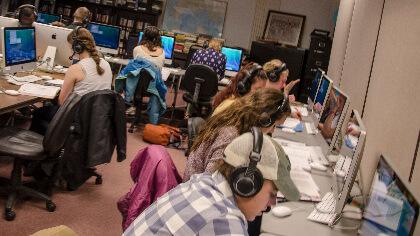On most Fridays during the fall semester students in Marielle Macias’s French 2 (Elementary II) class can be found conversing in the Language Resource Center (LRC) in Southwick Hall. Marielle is a lecturer in the Romance Languages and Linguistics Department, and her students come to the LRC to practice language with a newly acquired program called DiLL, which is short for Digital Language Lab. "Cliquez sur le concombre," Marielle says, referring to the cucumber icon that the software uses; however, most students are already logged in and ready to practice.
DiLL gives professors a graphical, switchboard-like interface so they can instantly direct conversations in any way they desire. Professors can broadcast soft speaking voices so they can be heard by the rest of the class, randomly form new pairs for conversation, and even record conversations as touchstones for future reference or for assessment.
DiLL does a great job of keeping faculty talk time to a minimum, while maximizing student talk time. "Everybody is active. Every student and instructor is active all at once," says Marielle, just after finishing her streak of four classes that make use of the software on Fridays. While students speak, Marielle taps into their conversations to make sure they are able to stay on point, occasionally providing corrections or feedback.
Conversations are pivotal in language learning and there is no substitute for them, so increasing the quality and amount of time spent in conversation is a new opportunity for students to grow linguistically. Students are expected to work for their conversations to be successful when they come to the LRC, but who says the work can't be fun? "As a matter of fact, this morning I was in the language lab when we were recording and they were really enjoying themselves and I was having fun listening to them," Marielle said.
Haley Wahl, a junior majoring in astrophysics, would agree. "I think the dialog assignments with the DiLL are really fun because it allows you to be creative and just talk in French and have conversations." She has been taking French 2 in the LRC all semester and has had a lot of opportunities to speak French with her classmates using DiLL. She took language courses in high school and by contrast she prefers the way that DiLL allows her to be creative and engaged in one-on-one conversation. "It's really fun to come to the lab because... I mean, you can get together outside and, you know, do one-on-one with people, but when you're paired with somebody (in the lab) who you don't know and you kind of help each other with that, it's a really helpful tool to use. It has definitely helped me become a better French speaker."
For those who have perfected two or more languages, LRC Director Scott Martindale has been working on a project called the UVM Translator Database. The goal of the database is to connect local groups and organizations in need of translation or interpretation services with those at UVM who can offer those services. "I was getting calls just about every week from police departments, lawyers, courts, and cultural groups in the Burlington area asking for help with locating translators," Scott recounts. "We were popping up at the top of Google search results, so it makes sense that they would try to get in touch with us. This is just the best way I could think of to satisfy the demand."
The project is still in its infancy—French and Spanish are currently the only two available languages—but Scott hopes it can one day start connecting members of the vast multi-cultural family that is UVM with each other, as well as with members of the community. The goal of the project is to match needs with abilities. "Before the database, there was no way to query who could help with what language. Now we can and we just need people to sign up."
Find out more details at the links below:
- UVM Language Resource Center: http://www.uvm.edu/~uvmlrc/
- UVM Translator Database: http://www.uvm.edu/~uvmlrc/vttrandb/
- Digital Language Lab: http://www.swifteducation.com
